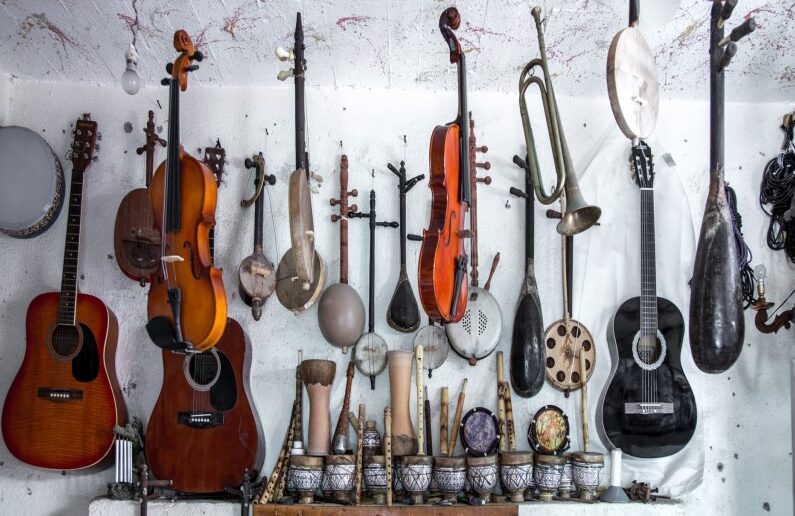The Top Instrumentalists Across Various Instruments
Have you ever witnessed a musician playing their instrument with such skill and mastery that it left you in awe? These individuals are known as virtuosos, possessing an incredible level of technical proficiency on their respective instruments. From pianists to guitarists, violinists to saxophonists, the world is filled with musical geniuses who have dedicated years of practice and discipline to reach this level of excellence. Join us as we explore the top instrumentalists across various genres and discover what makes them true virtuosos.
Types of Virtuosic Instruments
There are countless instruments in the world, each with its own set of challenges and complexities. However, not all instruments are created equal when it comes to virtuosity.
Some of the most popular virtuosic instruments include the piano, violin, guitar, saxophone, trumpet, and drums. These instruments require a unique skill set that can take years to master.
The technical demands of these instruments vary greatly from one another. For example, pianists must possess incredible finger dexterity to perform complex runs and arpeggios at lightning speeds. On the other hand, drummers need precise coordination between their hands and feet to execute intricate rhythms.
It’s worth noting that any instrument can be played with virtuosity if given enough dedication and practice time. Even seemingly simple instruments such as the harmonica or ukulele can be played with incredible skill by those who have put in the effort.
Ultimately, what makes an instrument “virtuosic” is how difficult it is to play at a high level compared to others in its category. The more technically challenging an instrument is to play proficiently will often determine its status as a virtuosic instrument.
The Different Levels of Virtuosity
Virtuosity is not a black and white concept; it exists on a spectrum, with varying degrees of proficiency. The different levels of virtuosity depend on the individual’s skills, experience, and dedication. At the lowest level, there are beginners who have basic knowledge but lack technical proficiency.
As one progresses in their instrumental prowess, they achieve intermediate status where they can play more complex pieces by mastering techniques such as finger dexterity or breath control. Players at this level may still require guidance or instruction to refine their craft.
The advanced level requires years of practice and discipline to master various playing styles, interpret music accurately and perform with precision. Advanced players possess an exceptional understanding of the music theory that allows them to improvise effortlessly while staying true to musical authenticity.
At the highest level sits expert virtuosos who have reached mastery over their instrument after spending countless hours practicing every single day for decades. They possess a unique sound signature that sets them apart from others in their field. These musicians break new ground through experimentation while continuing to uphold traditional technique rules.
Virtuosity is about continuous effort towards improvement – striving for excellence no matter what stage you are at in your journey as a musician.
What Makes a Virtuoso?
A virtuoso is someone who has mastered their instrument to an exceptional level, possessing impeccable technical skill, unparalleled musicality and expressiveness. But what distinguishes a virtuoso from other musicians?
Firstly, virtuosos possess an intense passion for music that drives them to strive for perfection in every performance. They have innate musical talent coupled with rigorous training spanning years or even decades.
Moreover, they have the ability to interpret and convey emotions through their playing by taking risks and experimenting with phrasing, dynamics and tone color. Their performances are often characterized by breathtaking speed, accuracy and fluidity.
Virtuosos also possess great versatility in their playing styles which enables them to adapt themselves effortlessly across different genres of music. They are innovative thinkers who push the boundaries of what’s possible on their instruments.
They have an unwavering commitment towards continuous learning and improvement throughout their careers which allows them to maintain excellence in their performances over time.
In short, it takes a combination of hard work, natural talent and unwavering dedication towards excellence that makes a true virtuoso.
The Benefits of Being a Virtuoso
Being a virtuoso instrumentalist has its perks, and it’s not just the admiration of fans. One benefit is that virtuosos often enjoy professional success and have more opportunities to perform in front of large audiences. They can also command higher fees for their performances, which means they can make a living doing what they love.
Another advantage is that virtuosos have access to a wider range of music than non-virtuosos. They are able to tackle complex pieces with ease, which gives them the freedom to explore various genres and experiment with different styles.
Virtuosos are also highly respected within their industry. Their level of skill and dedication sets them apart from other musicians, and this respect leads to more collaborations with other artists or even being invited as guest performers for prestigious events.
Furthermore, being a virtuoso requires discipline and hard work. The amount of practice required to achieve such high levels of performance means that those who become virtuosos develop strong work ethic habits that translate well into any career path they choose.
Perhaps one of the greatest benefits is the personal satisfaction derived from accomplishing something so difficult yet beautiful. Mastery over an instrument takes years if not decades but once achieved there’s nothing quite like playing your favorite piece flawlessly in front of an adoring crowd – it’s pure magic!
The Drawbacks of Being a Virtuoso
While being a virtuoso in an instrument is certainly impressive and rewarding, it also comes with its own set of drawbacks. One such drawback is the immense pressure to constantly improve and maintain one’s high level of skill. This can lead to feelings of burnout or even injury if proper self-care isn’t taken.
Additionally, the focus on technical proficiency sometimes overshadows the importance of musical expression and interpretation. Virtuosos may feel pressured to prioritize speed and accuracy over conveying emotion through their playing.
Another potential drawback is that virtuosos may struggle to find musicians at their same level to collaborate with, leading them to feel isolated within their musical community.
There can be a certain expectation placed on virtuosos by audiences and critics alike, which can create added stress and anxiety when performing live or releasing new music.
While being a virtuoso certainly has its perks, it’s important to acknowledge that there are also challenges that come along with this title.
How to Become a Virtuoso
Becoming a virtuoso is not an easy feat, but it’s definitely possible with dedication and hard work. Here are some tips on how to become a virtuoso:
1. Practice, practice, practice: There’s no shortcut to becoming a virtuoso besides putting in the hours of practice needed to perfect your craft. Make sure you’re practicing regularly and consistently.
2. Seek guidance from experts: Finding a mentor or taking lessons from someone who is already a virtuoso can provide valuable insights and techniques that will help you improve your skills faster.
3. Listen to other instrumentalists: Studying the works of other instrumentalists across various genres can help you learn new techniques and styles that you may not have considered before.
4. Attend workshops and masterclasses: Attending workshops and masterclasses can expose you to different perspectives on music theory, performance techniques, stage presence, among others.
5. Set goals for yourself: Setting specific goals helps keep motivation high by giving something tangible towards which to work.
Becoming a virtuoso requires perseverance combined with guidance from experts , knowledge in music theory as well as consistent practice over time in order achieve excellence at one’s chosen instrument..
To become a virtuoso, one must possess an exceptional level of technical skill and mastery over their chosen instrument. However, being a virtuoso is not just about technical proficiency; it requires passion, dedication, discipline, and perseverance.
Through exploring the top instrumentalists across various instruments, we have seen that virtuosos come in different levels and types depending on their chosen instrument. We have also discovered some of the benefits and drawbacks of being a virtuoso.
While becoming a virtuoso may seem like an unattainable goal for many musicians, it is important to remember that with hard work and determination anything is possible. By practicing regularly with focus and purpose, aspiring musicians can improve their skills and reach new levels of proficiency.
While there are many outstanding instrumentalists out there who demonstrate remarkable technique on their respective instruments at various degrees of virtuosity – what ultimately sets them apart from others is often how they express themselves through music with such deep emotionality. The true hallmark of any great musician is not simply how fast or accurately they play but rather how deeply they connect with listeners through sound alone.






